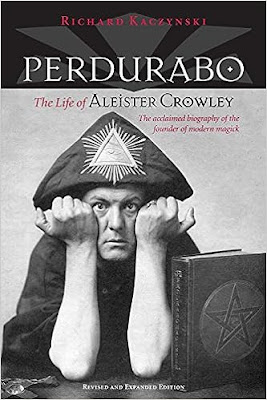I thought I would offer a few notes on Perdurabo, the biography of Aleister Crowley written by Richard Kaczynski.
I wanted to get background of knowledge about Crowley before reading the new Hilaritas Press book by Robert Anton Wilson, Lion of Light: Robert Anton Wilson on Aleister Crowley. I think Perdurabo succeeds in providing good information about Crowley's activities and beliefs, his Book of the Law and his belief that he was a prophet for a new creed. I read the "revised and expanded" edition, which runs to 720 pages, including the notes. It took me awhile to finish it.
I should note that it's also a pretty good read; whatever you think of Crowley's character, or the way he treated other people, there was seldom a dull moment in his life as a magician, mountain climber, poet and a person who apparently had dozens of sexual relationships. If you like name-dropping, you also will like this book: Crowley had relationships with or at least ran across many different famous people. And so you read about Crowley's feud with William Butler Yeats. You read about how one of his lovers had a teenage son, Preston, and that Preston and Crowley loathed each other, and eventually Kaczysnki reveals that "Preston" is Preston Sturges, the famous Hollywood film director and screenwriter. And so on and so on.
But while I generally enjoyed the celebrity portraits, one of them displeased me. At one point, Crowley had dealings with Walter Duranty, the infamous New York Times reporter who won the Pulitzer Prize in 1932 for his articles about the Soviet Union; Duranty is known now as the perhaps the most famous liar in journalism. He is best remembered for suppressing the truth about how Stalin starved to death many residents of Ukraine. The Wikipedia article gives a useful summary and how the current situation with Russia and Ukraine has not lessened awareness of the matter, or criticism of the New York Times. Kaczynski covers all this by writing that when Crowley met Duranty just before World War I, "Years would pass before he [Duranty] would be acclaimed for his coverage of World War I and the rise of Joseph Stalin." This seems a little bit like writing, about the young Adolf Hitler, "Years would pass before he would be acclaimed for his pioneering work in dealing with anti-Semitism."
Speaking of politics, as I read the book I kept in mind the comments of D.M.S. on my blog post announced the new Lion of Light reading group; D.M.S. wrote, "I would like to know more about RAWs views on the more ugly sides of AC, his sexism and racism (as well as misusing other people, losing his own will to a heavy addiction and sometimes being just a plain asshole) as it has been documented in many ways.
"I am having a hard time just to focus on his spiritual work and 'Ignore his morals, ignore his political views, ignore his very clear lack of understanding for most people' as an admittedly well written post an reddit says."
Most of D.M.S.' accusations seem true about Crowley's ugly sides, although the book does document that he became a heroin addict because he was given heroin by doctors to treat his bronchitis and asthma, which troubled him much of his life (bronchitis is part of what killed Crowley at age 72 in 1947.) And to give Crowley his due, he sacrificed his wealth and much of his time and energy to a single-minded dedication to learn what he believed he had discovered. Apparently he really was sincere.
The only comment from D.M.S. which puzzled me was the reference to Crowley's "political views." Insofar as he had political views (I could not make out after reading a book hundreds of pages long if he ever voted or had a favorite political party) it seemed to me he had little use for fascism, Nazis or Communists. Perdurabo documents that Crowley was booted out of Italy by the Fascist regime (a big setback, he had established an Abbey of Thelema in Sicily) and that Crowley responded by writing anti-Mussolini poems; that Crowley denounced the "peace in our time" pact that sold out Czechoslovakia and temporarily delayed World War II, and that Crowley wrote a scathing letter to a pro-Nazi Thelema follower in Germany, denouncing anti-Semitism, and that Crowley referenced "Murder and terror in Soviet Russia, Concentration Camps and persecution in Germany (Page 498). Crowley's political views were one of the few items of his personal life that did NOT bother me, as opposed to, for example, his cruel treatment of women and the often callous way he treated other people. But I am not an EXPERT on Crowley (as RAW sometimes spelled the word) and Crowley may well have had repugnant political opinions I am just not aware of.
Much of Crowley's misbehavior can be explained (but not excused) by his single-minded dedication to his mission. I read a biography of Prokofiev, the Russian composer, a couple of years ago, by Harlow Robinson, and the biographer remarked that Prokofiev treated other people as if he assumed the most useful thing they could do in their lives would be to support him in writing as much music as possible; Prokofiev was likely correct, but that does not excuse how he treated everyone, Robinson wrote. Crowley had a similar belief about his own importance.
Kaczynski recently announced on Facebook that an audiobook of Perdurabo is on the way; no details yet, but he has promised to post updates.

No comments:
Post a Comment